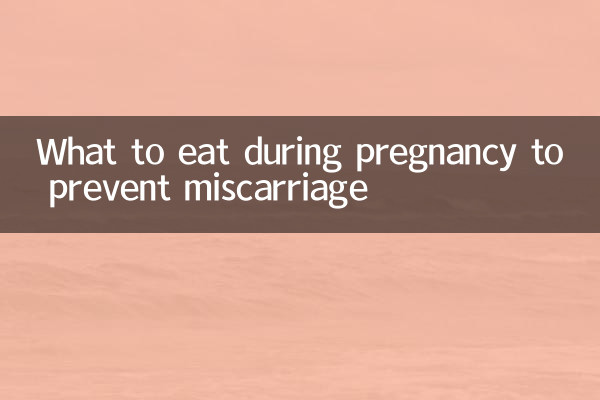What to eat during pregnancy to prevent miscarriage
During pregnancy, diet is crucial to the healthy development of the fetus. A reasonable diet can not only provide adequate nutrition, but also effectively reduce the risk of miscarriage. This article will combine the hot topics and hot content on the Internet in the past 10 days to introduce in detail how to prevent miscarriage through diet during pregnancy, and provide structured data for reference.
1. Key nutrients to prevent miscarriage

During pregnancy, certain nutrients are particularly important for the stable development of the fetus. Here are a few key nutrients and their roles:
| Nutrients | function | food source |
|---|---|---|
| folic acid | Prevent fetal neural tube defects and reduce the risk of miscarriage | Green leafy vegetables, legumes, citrus fruits |
| iron | Prevent anemia and ensure fetal oxygen supply | Red meat, liver, spinach |
| Calcium | Promote fetal bone development and prevent cramps in pregnant women | Milk, yogurt, tofu |
| Vitamin E | Antioxidant, protects fetal cells | Nuts, vegetable oils, whole grains |
| Omega-3 fatty acids | Promote fetal brain development and reduce the risk of premature birth | Deep-sea fish, flax seeds, walnuts |
2. Foods to avoid during pregnancy
In addition to supplementing with key nutrients, pregnant women also need to avoid certain foods that may increase the risk of miscarriage. Here are a few types of foods to be wary of:
| food category | risk | Alternative suggestions |
|---|---|---|
| Raw meat and fish | May carry parasites or bacteria that can cause infection | Choose well-cooked meats and fish |
| High Mercury Fish | Mercury may damage fetal nervous system | Choose low-mercury fish such as salmon and cod |
| Unpasteurized dairy products | May contain harmful bacteria | Choose pasteurized milk and cheese |
| caffeine overdose | May increase risk of miscarriage | Daily caffeine intake should not exceed 200 mg |
| alcohol | Directly harm fetal development | Avoid alcohol altogether |
3. Dietary recommendations to prevent miscarriage
1.balanced diet: Make sure each meal includes protein, carbohydrates, healthy fats and vitamins, and choose a variety of foods.
2.Eat small meals often: The burden on the digestive system increases during pregnancy. It is recommended to eat 5-6 small meals a day to avoid overeating.
3.drink more water: Maintaining adequate fluid intake helps blood circulation and fetal health.
4.cooking method: Try to choose healthy cooking methods such as steaming, boiling, and stewing, and avoid fried and high-salt foods.
4. Summary of hot topics on the entire network in the past 10 days
According to recent Internet hot topics, the following topics are highly relevant to pregnancy diet and miscarriage prevention:
| hot topics | focus of discussion | Related suggestions |
|---|---|---|
| superfoods during pregnancy | Which foods are particularly beneficial to pregnant women | Avocado, quinoa, blueberries, etc. |
| TCM fetal safety dietary therapy | Traditional Chinese Medicine’s Diet Plan for Preventing Pregnancy | Lotus seeds, yam, wolfberry, etc. |
| Nutritional supplements during pregnancy | Do you need additional nutrients? | Need to be taken under the guidance of a doctor |
| gestational diabetes diet | How to control blood sugar through diet | Low GI foods, control carbohydrate intake |
| Diet taboos in early pregnancy | Special precautions during the first three months of pregnancy | Avoid cold foods and ensure folic acid intake |
5. Summary
Dietary management during pregnancy is an important means to prevent miscarriage. By consuming enough key nutrients such as folic acid, iron, and calcium, avoiding high-risk foods, and following scientific dietary principles, the risk of miscarriage can be greatly reduced. It is recommended that pregnant women undergo regular prenatal check-ups and adjust their diet plan according to their personal circumstances to ensure the health of mother and baby.
Finally, a reminder that the suggestions provided in this article are for reference only. For specific dietary plans, please consult a professional doctor or nutritionist to develop a personalized nutrition plan based on your personal physique and pregnancy conditions.

check the details

check the details